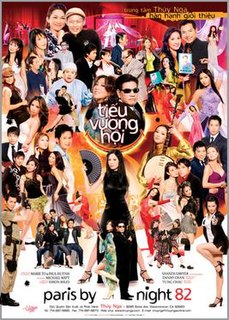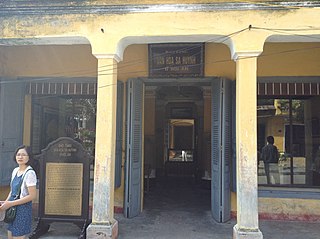
Traditional Vietnamese music is highly diverse and syncretistic, combining native and foreign influences, and influences from Vietnam's ethnic minority groups. Throughout its history, Vietnam has been most heavily influenced by the Chinese musical tradition, as an integral part, along with Korea, Mongolia and Japan. The former Indochinese kingdom of Champa also exerted some influence on Vietnam's traditional music.

Paris by Night is a direct-to-video series featuring Vietnamese-language musical variety shows produced by Thúy Nga Productions. Hosted mainly by Nguyễn Ngọc Ngạn and Nguyễn Cao Kỳ Duyên, the series includes musical performances by modern pop stars, traditional folk songs, one-act plays, and sketch comedy.

Hội An, formerly known as Fai-Fo or Faifoo, is a city with a population of approximately 120,000 in Vietnam's Quảng Nam Province and noted since 1999 as a UNESCO World Heritage Site.
Trịnh Công Sơn was a famous Vietnamese, musician, songwriter, painter and poet. He, along with Phạm Duy and Văn Cao, is an important figure in modern (non-classical) Vietnamese music. Many of Trịnh's songs are love songs. Others are anti-war songs, written during and about the Vietnam War; some of them were censored by the southern Republic of Vietnam and later by the Socialist Republic of Vietnam. Many performing artists, most notably Khánh Ly and Hồng Nhung, have interpreted Trinh Cong Son's music.

The Sa Huỳnh culture or Sa Huyun was a culture in modern-day central and southern Vietnam that flourished between 1000 BC and 200 AD. Archaeological sites from the culture have been discovered from the Mekong Delta to Quang Binh province in central Vietnam. The Sa Huynh people were most likely the predecessors of the Cham people, an Austronesian-speaking people and the founders of the kingdom of Champa.

Đồng Hới is the capital city of Quảng Bình Province in the north central coast of Vietnam. The city's area is 155.71 km2 (60.12 sq mi). Population as per the 2013 census was 160,000. It is served by National Highway 1A, the Đồng Hới Railway Station, and airport. By road, Đồng Hới is 486 kilometres (302 mi) south of Hanoi, 195 kilometres (121 mi) south of Vinh, 160 kilometres (99 mi) north of Huế and 1,204 kilometres (748 mi) north of Hồ Chí Minh City. It borders Quảng Ninh District on the west and south, the South China Sea on the east, Bố Trạch District on the north.

Paris By Night 82: Tiếu Vương Hội is a Paris By Night program that was filmed at Studio 40 of the Canadian Broadcasting Centre in Toronto, Canada on Saturday, March 25, 2006. It is one of Thúy Nga's "private" shows, as in, limited seats are available, and some are only invited guests only.
Lê Lâm Quỳnh Như, known professionally as Như Quỳnh, is a Vietnamese singer. Performing Vietnamese popular music in the diaspora, she is internationally known for her vocal style, as well as duets with musicians like Thế Sơn and Trường Vũ, with whom they have been noted to "link international Vietnamese music to Vietnam itself".

Sa Đéc is a District-level city in Đồng Tháp Province in the Mekong Delta of southern Vietnam. It is a river port and agricultural and industrial trading center, The Sa Dec economic zone consists of Chau Thanh, Lai Vung and Lap Vo districts.

Phan Khôi was an intellectual leader who inspired a North Vietnamese variety of the Chinese Hundred Flowers Campaign, in which scholars were permitted to criticize the Communist regime, but for which he himself was ultimately persecuted by the Communist Party of Vietnam.

The Sa Huynh Culture Museum is located in Hội An, in the Quảng Nam Province of central Vietnam. It is a museum showcasing the pre-historic Sa Huỳnh culture, showcasing terracotta work that has been found in the area.

Paris By Night 92: Nhạc Yêu Cầu was filmed on May 10, 2008 and May 11, 2008 at Knott's Berry Farm, California. In an attempt to make the programs more diverse, Thúy Nga had encouraged the fans to send in their requests in the format of video clips. The requested songs can be done by an individual or a group of people.

Paris By Night 91: Huế, Sài Gòn, Hà Nội is a Paris By Night program produced by Thúy Nga that was filmed at the Terrace Theater at the Long Beach Convention and Entertainment Center on January 12, 2008 and January 13, 2008.

Nguyễn Thị Hương Thủy, commonly known by her stage name Hương Thủy, is a Vietnamese language singer from southern Vietnam known for Ca dao and Cải Lương singing. She appears on the long running Vietnamese diaspora variety show Paris By Night, making her debut in Paris By Night 72: Tiếng Hát Từ Nhịp Tim. She also acts in their plays and musicals.

Paris By Night 59: Cây Đa Bến Cũ is a Paris By Night TV program produced by Thúy Nga that was filmed at CBC Toronto Studios - Studio 40, Toronto, Canada in 2000. Nguyễn Ngọc Ngạn was the master of ceremonies for this program. This was a volume in the series Paris By Night that did not include a comedy skit or have something known as a "Hài Kịch". The DVD version of Paris By Night required only a single disc, while the VHS version is a three-tape set. This program had no audience.
Trương Tấn Bửu, also called Trương Tấn Long (張進隆), was a general and official of the Nguyễn dynasty of Vietnam He was born in 1752 in Thạch Phú Đông, Giồng Trôm District, Bến Tre Province. In 1797, he joined the army of Nguyễn Ánh and became a đốc chiêu cai cơ (commander). Later, he became the Deputy Marshal of the Nguyễn's Army's Front Division. In 1802, after the unification of Vietnam, he became the military commander of Nguyen's armies in northern Vietnam and later the Viceroy of Bắc Thành. In 1816, he became the Deputy Marshal of the Nguyễn Army's Central Division which guarding Huế, the capital of Nguyễn dynasty. In 1823, he took up the post of Viceroy of Gia Định replacing Lê Văn Duyệt. Shortly thereafter, he retired because of illness and then died in 1827 at the age of 75.

Lưu Esther, known professionally as Hari Won, is a Vietnamese-Korean singer and actress.

The Face Vietnam season 1 is a Vietnamese modeling-themed reality television series, based on the US television series of the same name, and one of several national editions in the international The Face franchise. Hồ Ngọc Hà, Phạm Hương and Lan Khuê served as model coaches and Vĩnh Thụy served as a host for the first season. The first season premiered on 18 June 2016 on VTV3.
Love Case is a 2008 Vietnamese telefilm adapted from Hồ Văn Trung's July 1941 novel Cư kỉnh (居璟). The film was produced by Ho Chi Minh City Television and directed by Võ Việt Hùng.















